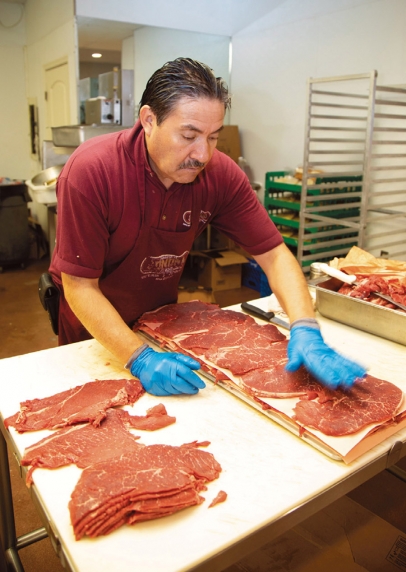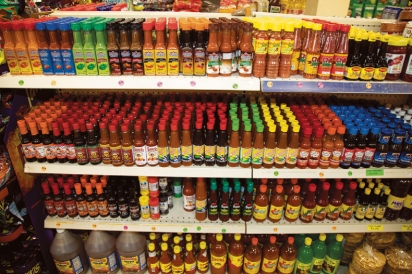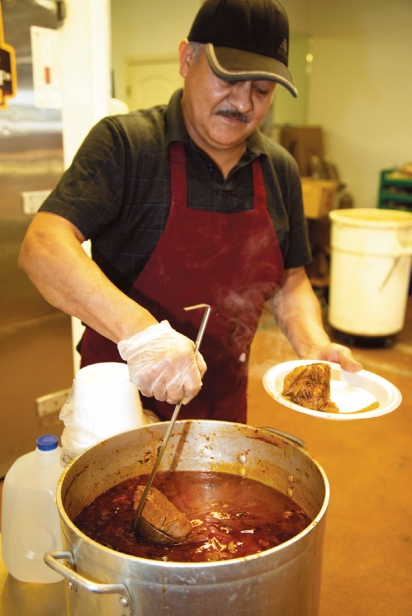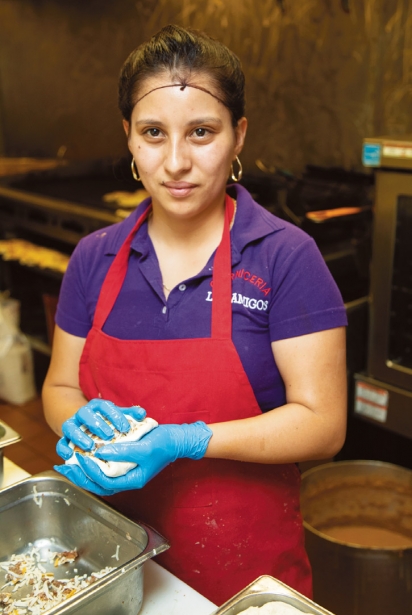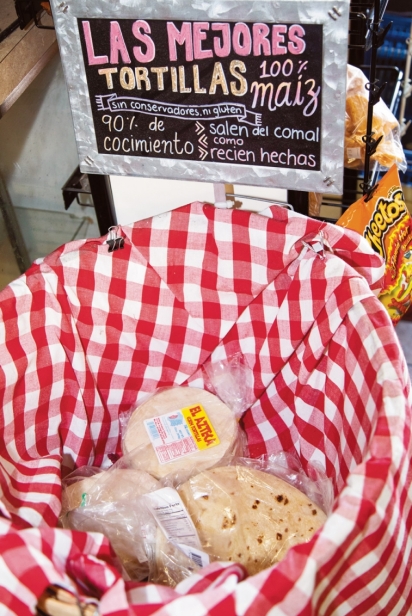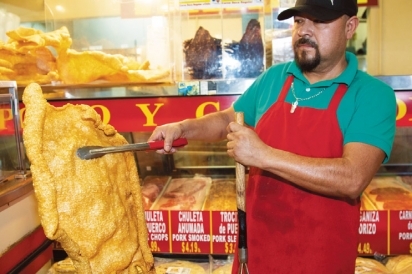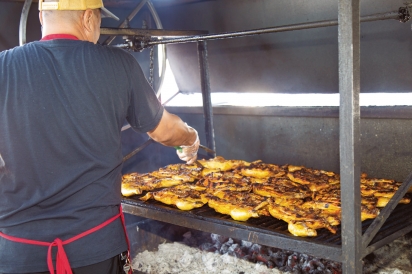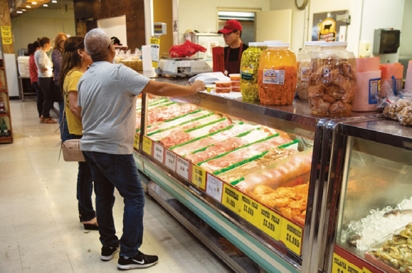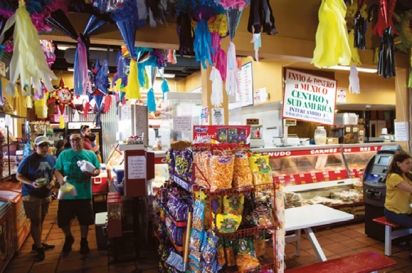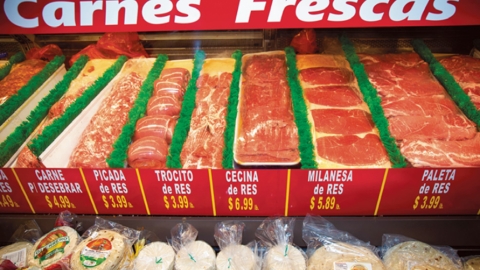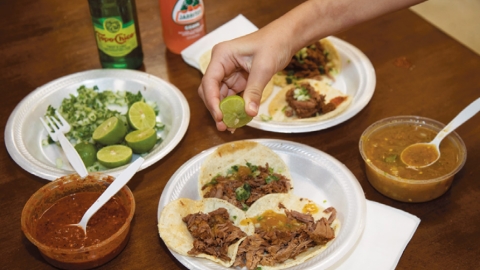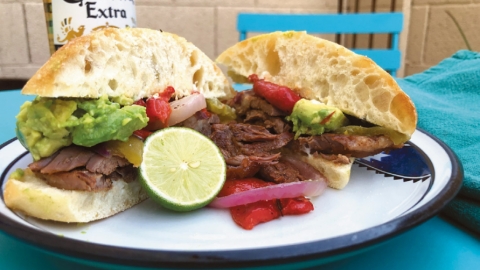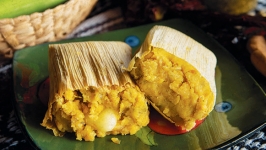Carnicerias
IN SEARCH OF THE PERFECT CARNE ASADA: VISITING VALLEY CARNICERIAS
It was a warm Saturday afternoon when we pulled into the parking lot of a strip mall near the border between Phoenix and Tempe. The scent of meat roasting over mesquite perfumed the air, and Mexican pop music blared from a speaker above the sidewalk where a mini flea market sported a table full of yoyos, bracelets, keychains, toys and religious figurines. The place was Carniceria Los Amigos, one of the many Mexican meat markets dotting the Valley.
Inside Los Amigos, a hungry mob crowded the small takeout counter, even though the lunch rush should have been over. I asked one of the other customers what we should try, and he said, without hesitation, “Oh, get the Number One. Their carne asada is the best, and it comes with rice and beans and salsa. And tortillas. You can’t beat it for 24 bucks” for a family-size order. After meandering around the store for a little while to check out the other offerings, I picked up a few Mexican limes, an avocado and the suggested combination, a hefty three pounds of meat. It was enough for two of us to enjoy dinner one night and lunch for the next two days. The carne asada was thin, tender and perfectly spiced; the tortillas reminded me of the ones we bought at the tortilleria when I was growing up on the border; and the chiltepin salsa had plenty of fire and flavor to match.
Carnicerias (butcher shops) are all about meat, but they’re also a treasure trove of Mexican specialties. You can buy plenty of Mexican cuts of beef and pork, to be sure, but most carnicerias are filled to bursting with Mexican beers, sodas, cheeses, produce, hot sauces, pan dulce and tortillas, along with piñatas, Pepto Bismol, Advil, paper goods and even an occasional pair of dancing shoes. Part bodega, part taco stand, they’re centers of commerce and social life, places to connect with the familiar flavors of home for people who now live on the north side of the border. But they’re also convenient places to shop for anyone who appreciates authentic products and meat at a reasonable price.
On the next visit, Art, an employee who didn’t give me his last name, escorted us into the kitchen where a giant vat of barbacoa bubbled in one corner and Maria Magdalena assembled and cooked pupusas, a Central American specialty made of masa stuffed with meat or vegetables and then smashed flat and cooked on the griddle. The centerpiece of the place, as in all carnicerias, was the meat counter. Trays of camarones (shrimp), pescado (fish), pollo (chicken), puerco (pork) and carne de res (beef) were lined up with flats of chorizo, longaniza and spiced carne asada and al pastor, ready to take home and cook. Art said the shrimp comes from Mexico, and the meat is from the U.S., but cut in the store.
Juan Lopez owns Los Amigos and recently opened another carniceria in Guadalupe called Amigos. When we stopped by, the tables on the patio out front were filled with people enjoying their tacos and tortas. The store also has a good selection of imported Mexican specialties, including dried chiltepins from Sonora, as well as tortillas, cheeses and pupusas.
Up the street from Los Amigos, at Carniceria Sonora, the tortilla machine was running full speed. Soft, tender, fragrant corn tortillas dropped from the conveyor belt to be promptly packaged. Unlike mass-produced tortillas made from Maseca, a brand of dried corn flour, those at Sonora are made from nixtamal, corn kernels boiled and soaked in slaked lime, then drained and ground into masa. They’re dangerously tasty. In fact, it was hard to resist opening the bag in the car and snacking on the way home.
The manager, Daniel Paz, dished up some barbacoa tacos as he told us the beef in the store is all Certified Angus and cut on the spot. Sonora also has a raspado (shaved ice) bar so you can quench your thirst on a hot summer day—or tame the heat from the fiery salsa. In addition to fresh meat and seafood, Sonora offers prepared takeout food like menudo and carnitas, as well as meat marinated and ready to grill. There are also plenty of packaged foods from Mexico: coyotas (a cookie), Jumex juices and Mexican Coca-Cola.
At Carniceria del Pacifico near 36th and Thomas in Phoenix, butcher Damian Blancas showed us how he makes chicharrones, deep-fried pork skin. After trimming away the fat and drying the skins on a rack, he plunges them into a vat of hot oil, where they puff, curl and turn golden brown. After a sprinkle of salt, he places them in the case on the counter where they’re ready for customers to turn them into tacos or crunchy snacks.
Del Pacifico sells a full line of meats and seafood, as well as prepared takeout. If you don’t want to cook their pollo asado (grilled chicken) at home, they have a grill out front where they’ll do it for you. They carry plenty of Mexican candies, sweets and groceries, also.
Shopping at a carniceria can be an adventure in learning new food terms and making new friends. Speaking a little Spanish helps, but isn’t necessary. What is helpful is knowing what the various meat cuts are in Spanish. You probably won’t find too many pot roasts or porterhouses, but you will find lots of flat, thin cuts suitable for marinating, grilling and braising, along with spices, chiles, tortillas and other staples of Mexican cooking.


